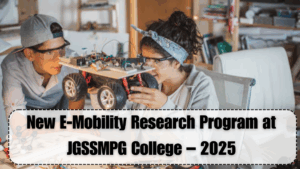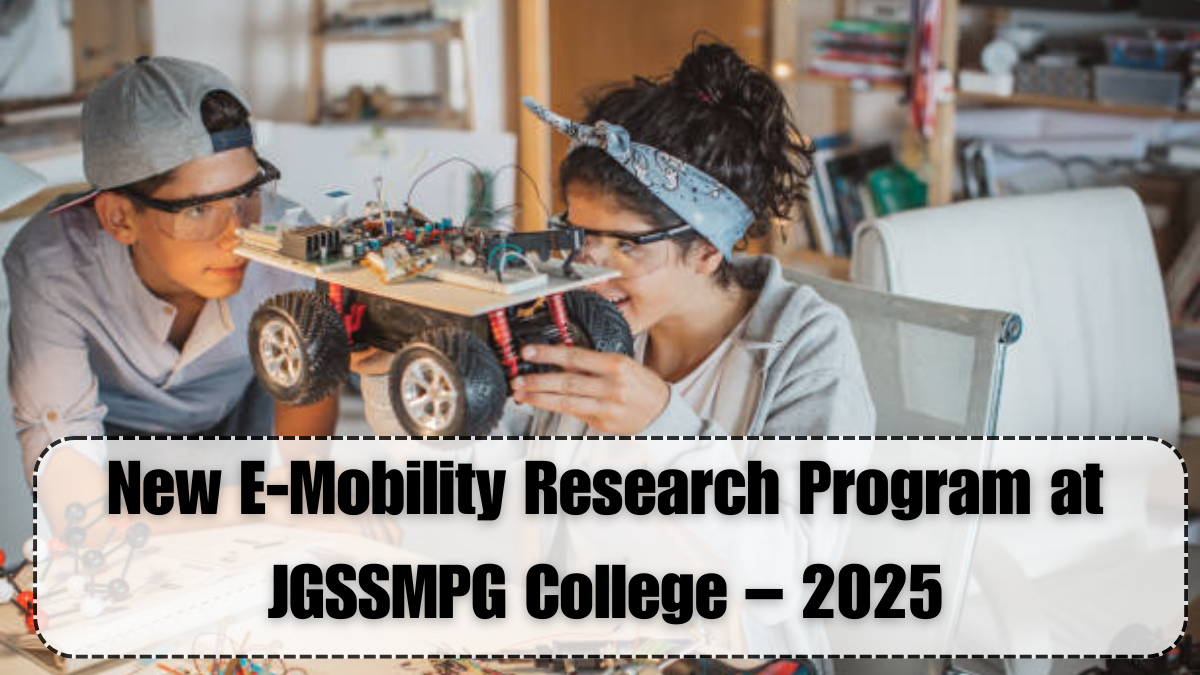In 2025, JGSSMPG College has officially launched a dedicated e-mobility research program to encourage student innovation and applied learning in the field of electric vehicles. With the EV industry booming across India, this initiative provides a structured platform for students to conduct research, build prototypes, and contribute to the growing body of academic knowledge in electric mobility.
The e-mobility research program is open to students from engineering, science, and environmental studies, and integrates hands-on experimentation with mentorship from industry professionals. It marks a major leap in the college’s transformation into a future-ready e-campus, where sustainable transportation isn’t just taught—but built and tested on site.

Research Meets Real-World Impact
The goal of the e-mobility research program is to help students move beyond textbooks and apply theoretical knowledge to practical solutions. Current projects include battery degradation studies, low-cost motor controllers, solar charging prototypes, and e-bike assembly workshops. These research topics are highly relevant and designed to prepare students for real-world EV challenges.
Students are also working on optimizing battery range, integrating regenerative braking systems, and designing compact electric delivery vehicles suitable for rural logistics. With each project, they contribute to India’s rapidly evolving EV research ecosystem, bridging the gap between academics and industry needs.
Collaboration with Faculty and Startups
Each student-led team in the e-mobility research program is paired with faculty mentors and professionals from local EV startups. This mentorship model ensures high-quality output while giving students valuable exposure to product development cycles and EV regulations.
JGSSMPG College has also signed MoUs with e-bike manufacturers, solar companies, and mobility incubators to provide access to real components, data, and internships. This strategic collaboration reinforces the practical nature of the EV research being done and increases the placement readiness of participating students.
Building the Foundation of an E-Campus
The research program is part of a broader initiative to convert JGSSMPG into a model e-campus. Charging stations, solar panels, electric scooters for faculty, and energy dashboards are already in place. Students contributing to the e-mobility research program are directly involved in designing and maintaining these facilities.
One standout student team recently developed a mobile EV diagnostic kit that can be used for field servicing in remote areas. Another group is studying EV charging behavior and optimizing schedules based on solar availability. These projects showcase how student innovation is powering real solutions within the campus.
Encouraging Entrepreneurship and Patents
JGSSMPG is not only promoting academic research—it’s actively supporting innovation that leads to business opportunities. The college’s innovation cell helps students file patents, present at tech expos, and develop go-to-market strategies for their prototypes.
The e-mobility research program is thus playing a dual role: supporting deep EV research and giving birth to future entrepreneurs who can design, build, and launch their own products in the sustainable mobility space.
Summary Table – Key Highlights of JGSSMPG’s E-Mobility Research Program (2025)
| Feature | Description |
|---|---|
| Program Focus | Hands-on EV innovation and practical student projects |
| Industry Support | Mentorship and collaboration with EV startups and clean tech companies |
| Campus Integration | Projects contribute to live e-campus infrastructure and facilities |
| Innovation Pipeline | Support for patent filing, entrepreneurship, and market testing |
| Student Participation | Multidisciplinary teams from engineering, science, and sustainability fields |
FAQs
What is the e-mobility research program at JGSSMPG?
The e-mobility research program is a structured initiative at JGSSMPG College that allows students to work on real EV projects under faculty and industry mentorship.
Who can participate in the EV research projects?
Students from engineering, science, and sustainability backgrounds are encouraged to join the EV research teams, often working in interdisciplinary groups.
What are some key projects under the program?
Projects include battery diagnostics, solar charging stations, compact EV designs, and tools for remote diagnostics—all part of the college’s student innovation efforts.
How is the research integrated with campus facilities?
The e-campus infrastructure, including charging stations and e-scooter programs, is directly maintained and improved by research students.
Are students receiving support for their inventions?
Yes, JGSSMPG helps students file patents, develop business models, and connect with startups—fueling long-term student innovation in EV technology.
Click here to know more.
